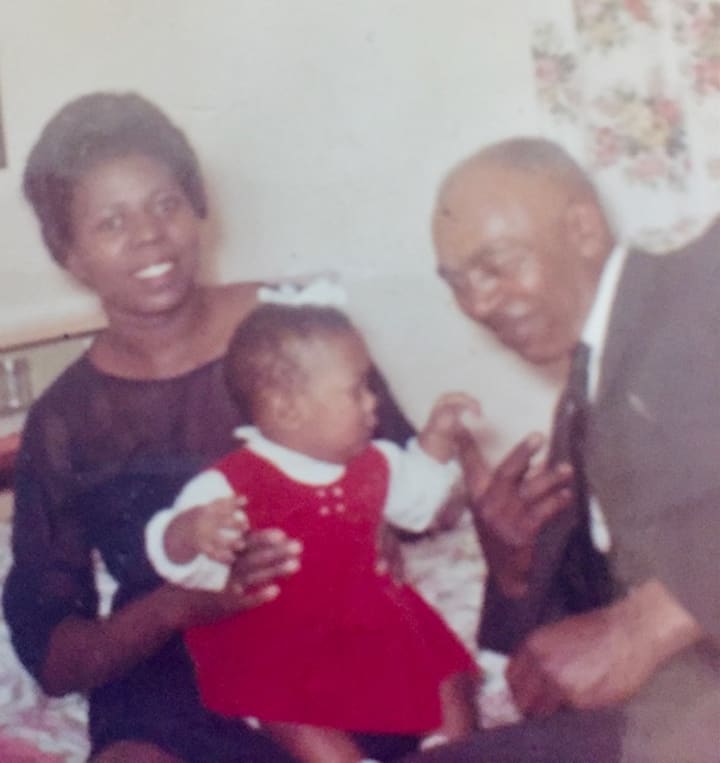Triangle of Bonds: Dad, Mom and Dad's Wife
It took me decades to understand, accept it

––“Who’s your daddy?” The church lady loomed vulture-like, with bright red lipstick on smirking lips and teeth; chin hairs poked from cracks in two-shades-too-light makeup.
No older than 10, I couldn’t fathom why that even mattered to her. Trapped behind First Baptist Church’s towering mahogany door, open to arriving parishioners, I took deep breaths with each swell of the organ’s hymn.
This encounter would become a catalyst for decades of pondering the complications of love and relationships, my own family’s twisted dynamics and just how two women learned to live with it.
But at that moment, I just wanted my momma.
At home with a newborn, she would not have tolerated this. Not the no-nonsense person who could cut you to the quick by saying, “I don’t mean no harm, but …” Not the statuesque woman who attracted admiring looks from men and respect from women for her well-mannered children.
“She will be the mother of my children,” he declared, as if bestowing an honor.
The oldest of five, I envisioned myself a child of destiny, a fulfillment of prophecy. Or, so goes the family story that begins with a journey from rural Newberry, S.C., to the city of Charlotte, N.C.
In Charlotte, Dad rented out a shotgun house to Aunt Bert, a domestic who was the sister of my great-grandfather’s wife. At Aunt Bert’s, Dad spotted a photo of Mom.
“She will be the mother of my children,” he declared as if bestowing an honor.
“The girl doesn’t even live here,” Aunt Bert said.
“She will come,” he told her.
Aunt Bert, who had a contagious cackle and an endless twinkle in her eyes, didn’t totally dismiss the prediction. Dad’s mother was full-blooded Cherokee; he could have some extra senses, she figured.
Sure enough, Mom did move in with Aunt Bert after high school to find work. Her family could only afford to send an older sister to college. That led to the inevitable: A smooth-talking, bow-legged older man with wavy hair and a Clark Gable mustache won over a naïve country girl.
An eighth-grade dropout, Dad worked at the cotton mill and part-time as our church’s custodian. He took us along with him to polish the pews on Saturdays until we figured out it was more work than adventure.
Dad’s limited education did not prevent him from making bold pronouncements of “facts.” He once pointed to the overhead light in his Chevy Impala and said something close to: “That light takes 5.6 centimeters and three-fourths seconds to turn on.”
Over the years, we children went from open-mouth awe to barely conceal laughter as he shared such special knowledge. He liked to talk — to anyone and everyone. On family outings to Burger Chef, he would strike up long conservations with strangers standing in line. Mom began sending me to order with him. That way, the burgers would get back to the car still warm.
After their second child, Mom, still in her 20s, decided to marry a man her own age. She moved her children to his family home in Asheville. In what had to feel like a curse, her husband died of leukemia before the birth of their own child. So, she moved with three children back to Charlotte — and to Dad. They had two more children.

Dad came to the house every afternoon after his shift ended and before Mom got home from work as a supervisor at a printing company. Truth be told, he spent a lot of that time napping in the car or sipping from brown paper bags.
I wondered how the wife made peace with it all. Just how bold — or cold — were my parents to put it in her face?
One Sunday morning, I was surprised to find him in the house. While he was often there when we went to bed, it was rare for him to get dressed and eat breakfast there. Leaning against the bathroom door, I watched his shaving ritual, using the Old Spice we always gave him for Father’s Day. Such a mundane moment is one of my fondest memories. Our family felt normal.
That fantasy shattered for good on a day he picked us up to take us to church. He was not in his Sunday clothes and a woman I recognized from church was in the car. She sat beside him in the front; Mom was by the door and we kids packed the back seat. Silence weighed down the air; the front passengers stared straight ahead and everyone seemed afraid to even shift in their seats.
The short, prim woman — one of the church mothers who wore ornate hats to match their outfits — had the same last name as my father. No relation, I had assumed. Maybe a cousin?
What had intrigued me most about her was that, for a while, she sported a neatly trimmed mustache, making no attempt to hide it under powder. I marveled at such defiance. Sometimes our eyes met during church; a few times we had exchanged hellos.
We got another ride home from church that day. Soon after, Mom bought her own car, putting herself on the road to the independent life she would eventually lead. When I was in high school, she bought her first house, demanding a contribution from Dad, who could be tight-fisted. Dad would remain part of our lives, but she refused to be dependent on him.
It has taken a while to sort out how I felt about my family situation. My existence no longer seemed magical, just murky.
Children born out of wedlock were certainly common in the 1950s, especially since the divorce was not routine. The wife, who had no children of her own, refused to grant a divorce. Dad once suggested that we all relocate to another city, but Mom did not want to live away from her sisters who had moved to the city. So, everybody settled into an “I know, but don’t know” detente.
To Dad’s credit, he did not hide us. But to have everyone in the same church? One full of prominent lawyers, doctors, and educators? I wondered how the wife made peace with it all. Just how bold — or cold — were my parents to put it in her face?
Yet, when the cigarette smoke and cotton fibers teamed up to kill Dad at 63, it was the wife who was at his side. I was a college junior by then. At the funeral, we were not part of the family processional; but the widow reserved space for us in the pew right behind them.
Were Mom’s visits an act of atonement? Or were they simply bonded by their love for the same man?
The widow lived to age 96. Mom visited her, brought her groceries and ran some errands. When I would call home, Mom would send me greetings from her and give me updates on her health, as if she was a distant aunt.
That creeped me out.
Now, though, I have more appreciation for the widow and some sympathy about of how trapped she must have felt. She could have made our lives miserable.
She was willing to see her husband’s features in our faces as we got baptized, participated in church productions and sang in the choir. Those experiences created a sense of belonging, helped build confidence and raise life expectations. She let us have that.
In the early years of this relationship tangle, Mom told me years later, Dad had the audacity to suggest that the wife consider Mom as a daughter. I like to imagine that the wife slapped him hard for that.
Yet, these two women did find some comfort in each other as the years progressed. I am sure the widow valued any companionship as she outlived friends and family. Were Mom’s visits an act of atonement? Or were they simply bonded by their love for the same man?
Of course, these were all issues of love and personal connections that I had no clue about as a child accosted by a Sunday School teacher who was a notorious gossip.
All I could muster at that moment was to puff out my chest and declare: “My daddy’s Mr. Morehead — the deacon.”
After decades of reassessment, I would only add one thing: “Amen.”
About the Creator
Vanessa Gallman
Commentator on political events, explorer of human nature






Comments
There are no comments for this story
Be the first to respond and start the conversation.